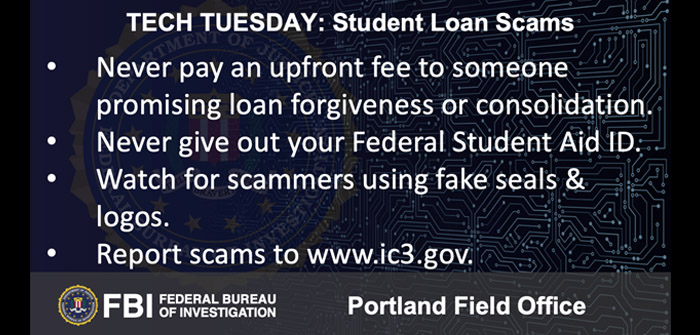(Graphic | Courtesy of Oregon FBI)
Under COVID relief efforts, the government put a pause on the need to make payments toward federal student loans. That forbearance program was originally set to expire a few weeks ago, but now it is in place until May. Regardless of when it expires, fraudsters are taking advantage of the situation to target anxious loan holders.
Bad actors are using text messages, emails and even voicemails to target loan holders as they attempt to cash out on your stress. They are offering easy ways to consolidate or even eliminate your loans. Take a listen:
“This is … from student loan support. Our records indicate that you were eligible for a loan forgiveness program but never completed the required documents. If you want to proceed with this application, we need to speak with you today. Please give us a call…”
Our partners at the Federal Trade Commission have some helpful advice:
- Never pay an upfront fee. It’s illegal for companies to charge you before they help you. Also, remember that there’s nothing a company can do for you that you can’t do yourself for free. And you never have to pay to get help from the Department of Education.
- Never give out your Federal Student Aid ID, your Social Security number or other personal information to anyone who contacts you. Scammers posing as student loan servicers can use this information to log into your account, change your contact information and even divert your payments to them. Instead of giving out your FSA ID, call or contact your servicer.
- Don’t sign up for quick loan forgiveness. Scammers might say they can get rid of your loans before they know the details of your situation. Or they might promise a loan forgiveness program — that most people won’t qualify for.
- Scammers use fake seals and logos to lure people in. They promise special access to repayment plans, new federal loan consolidations or loan forgiveness programs. It’s a lie. If you have federal loans, go to the Department of Education directly at gov.
If you are the victim of a student loan scam you can report it to the FTC at ReportFraud.ftc.gov.
If you are the victim of any online fraud, you should report the incident to the FBI’s Internet Crime Complaint Center at ic3.gov or call your FBI local office.





